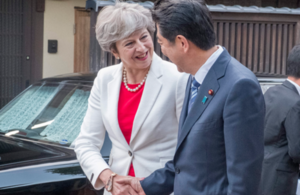UK security and defence collaboration with Japan steps up a level
The UK and Japan will work more closely together than ever before on cyber security, counter-terrorism and defence.

PM greets Prime Minister Shinzo Abe
In light of serious challenges to the rules-based international order - most recently the unprecedented threat posed by North Korea - the Prime Minister Theresa May is set to announce a significant step up in cooperation.
Japan is already the UK’s closest security partner in Asia, and the Prime Minister will say that even closer cooperation will ensure we can continue to stand alongside our Japanese friends and allies to further our shared interests and meet our shared challenges in an uncertain world.
The Prime Minister is expected to say that Japan is a natural partner for the UK on defence and security issues, as two outward-looking countries both firmly committed to supporting the rules-based international system and the promotion of democratic values.
As responsible members of the United Nations and through our cooperation on the Security Council, we work together in pursuit of important common foreign policy goals, including finding a peaceful solution to the North Korean problem and ensuring the rigorous implementation of sanctions against the North Korean regime. Our military personnel also work alongside one another in anti-piracy operations in the Gulf of Aden, and we are jointly leading pioneering de-mining and peacekeeping work across Africa.
Highlighting the importance both sides are placing on working more closely together than ever before, the Prime Minister will today attend a meeting of the Japanese National Security Council in Tokyo – becoming only the second ever foreign leader to do so and the first European leader ever to be granted such privileged access.
The two leaders are expected to agree a new “Joint Declaration on Security Cooperation” with the UK, which will include.
-
Defence:
While recognising that our work together on defence is already particularly strong, with our Typhoon fighter jets exercising in Japan last year for example, the Prime Minister will announce that we are now taking this even further with the deployment of HMS Argyll to the region in December 2018, and UK troops exercising jointly with their Japanese counterparts next year. This will be a first for non-US troops on Japanese soil.
-
Cyber Security:
Following PM Abe’s visit to the UK’s National Cyber Security Centre earlier this year, the UK and Japan will agree to cooperate on cyber security ahead of the 2019 Rugby World Cup and 2020 Tokyo Olympics and Paralympics and share best practice and expertise, including through an exchange of expert visits. The UK’s support, built on decades of expertise in managing cyber crime and other malicious cyber activity, will help enhance Games security.
-
Counter Terrorism:
The two countries will agree much improved information-sharing and will strengthen cooperation on aviation security and tackling violent extremism. We will also offer practical support to Japan’s Olympics counter-terrorism preparation, sharing best practice on mass event safety and security through expert exchanges.
The Prime Minister will visit the headquarters of the Japanese Maritime Self Defence Force (JMSDF) at Yokosuka outside Tokyo today, where she will receive a briefing from Japanese and UK military personnel on-board IZUMO, the largest vessel in the JMSDF. The briefing will focus on the strength of the UK-Japan defence relationship, including joint mine countermeasures work in the region.
Speaking at the National Security Council today, the Prime Minister will say:
It is a great honour to be invited to attend this meeting of Japan’s National Security Council.
As two outward-facing countries with many shared priorities and shared challenges, Japan remains a natural partner for us on defence and security issues.
I am determined that our defence and security cooperation will continue to go from strength to strength, enhancing our collective response to threats to the international order and to global peace and security, through increased cooperation on defence, cyber security, and counter-terrorism.
And that must include confronting the threat that North Korea poses and ensuring the regime stops its aggressive acts.